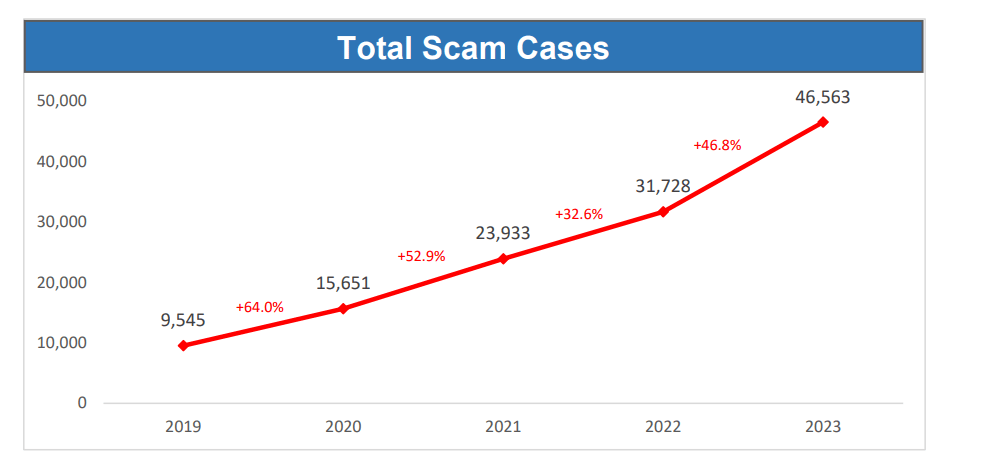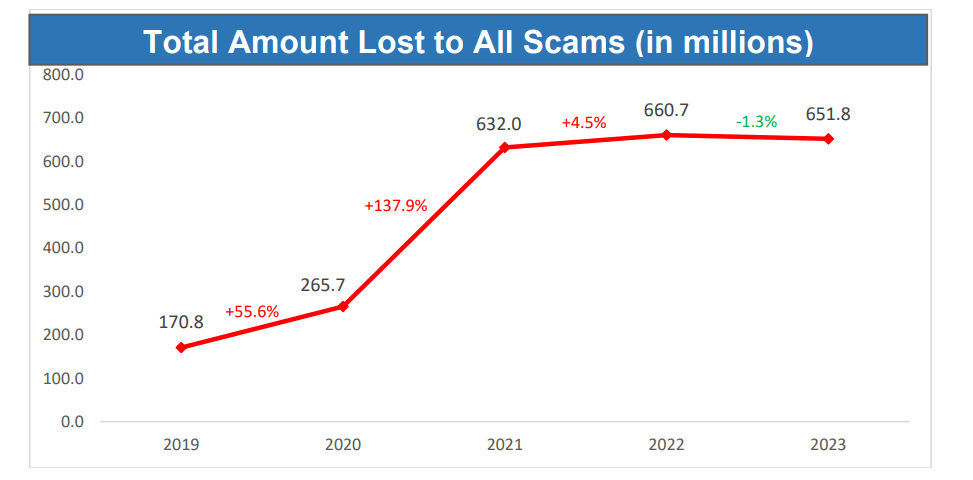
Despite the increase in scam cases, the total amount lost to scams in Singapore decreased to S$651.8 million in 2023, marking the first decline in five years.
In 2023, Singapore witnessed a significant rise in scam cases, reaching more than 46,000 reported incidents. Despite the surge in cases, the amount of money lost by victims decreased slightly by 1.3%. The total number of cases marked a substantial increase of 46.8% from the previous year, reaching 46,563 cases – the highest recorded since the police started tracking scams in 2016.
While the total amount lost to scams in Singapore slightly decreased from S$660.7 million to S$651.8 million in 2023, authorities attribute this to collaborative efforts between the government and private sector, including banks, to prevent or mitigate scams in progress.
Job scams ranked as the top type of scams, followed by e-commerce scams, fake friend call scams, phishing scams, and investment scams. Notably, malware-enabled scams targeting Android devices, which surged in 2023, accounted for at least S$34.1 million in losses last year. Authorities emphasize the ongoing need for vigilance against scams.
Releasing annual data separately for scam and cybercrime cases for the second consecutive year, the Singapore Police Force (SPF) reported a significant increase, with the total number rising by 49.6% to 50,376 cases in 2023 compared to 33,669 cases in 2022.
This distinction reflects the growing impact of scams and cybercrime on crime indicators, necessitating dedicated attention to address these evolving challenges in the digital realm. Authorities continue to emphasize the importance of public awareness and collaboration to combat the rising threat of scams and cybercrimes in Singapore.
Scam cases in Singapore surged by nearly 50 percent in 2023, with a significant number of victims falling prey to job and e-commerce scams


Individuals aged 30 to 49 years old were the most susceptible to scams in 2023, comprising 43.1% of all victims. This age group faced the highest proportion of scam-related incidents, emphasizing the need for targeted awareness campaigns and education to enhance their resilience against fraudulent activities. As scams continue to evolve, efforts to inform and educate this demographic about common tactics and preventive measures become increasingly important in the fight against scams.
The Singapore Police Force expressed concern over a “sharp increase” in scams conducted through social media and messaging platforms, including Facebook, WhatsApp, Instagram, and Telegram, all owned by Meta. Authorities noted that Meta appeared “resistant” to cooperating with police on anti-scam measures. As these platforms continue to be popular avenues for scammers, collaboration between law enforcement and social media companies becomes crucial to effectively combat and prevent fraudulent activities.




